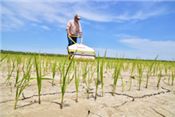|
Cool Weather Delays Spring Crops

LSU AgCenter research associate Carl Dischler marks research plots of young rice at the LSU
AgCenter H. Rouse Caffey Rice Research Station near Crowley. Cool weather in April has
delayed growth and development of the rice crop, and several other commodities also have been affected.
Photo by Bruce Schultz/LSU AgCenter
CROWLEY, LA.
Cool April weather has slowed growth of recently planted crops, especially rice. The season started with good planting conditions in March. “But the cool weather set in after emergence, and everything just slowed down,” said LSU AgCenter extension rice specialist Dustin Harrell.
By now, he said, rice plants should be at the four- to five-leaf stage and ready to flood, but most are at two to three leaves.
Harrell doubts the weather will affect this year’s crop in the long run. “As long as we’re not having freezing temperatures, it’s just delaying the growth and development of the rice crop,” he said.
Some farmers are changing their herbicides to avoid injuring young rice, and flooding fields has been delayed because plants are shorter than usual.
Last year, the crop growth was slowed by flooding rains and cloudy weather, Harrell said.
AgCenter extension associate Keith Fontenot, with the AgCenter rice verification program, said some farmers who water-seeded their crop are having to replant because high winds caused seed to drift to one side of a field.
“We did see some leaf tips dried out from the wind and the cold,” Fontenot said.
Jay Grymes, LSU AgCenter adjunct climatologist, said March temperatures were 2 to 3 degrees above normal. “April has been running cool, 2 to 4 degrees below the norm for the two-plus weeks for northern Louisiana, and 1 to 3 degrees below the norm for the southern half,” he said.
April so far has been wetter than normal for many parishes, and that could delay the soil from warming, he said.
AgCenter soybean specialist Todd Spivey said soybeans planted so far should not be hurt by the cool temperatures, although plant development will be delayed. “For the most part, we should be OK,” he said.
Soybeans can survive cold weather as long as temperatures aren’t below freezing for long periods. Some leaf tips may turn brown, but the plants should be OK, “as long as the growing point is still green,” Spivey said.
The plants can make up for the growth delay, but the cold’s effects could be noticeable at harvest. “We can lose a little bit of yield potential,” he said.
Most of the soybeans already planted are far enough south that the cold will have little influence on the crop.
AgCenter sugarcane specialist Kenneth Gravois said the sugarcane crop also has had problems with cool weather.
“Cane is a tough crop, but the cool, wet April has not been optimal weather. Warm and dry is important for the crop to tiller,” he said.
Excess rainfall and cold have triggered brown stripe disease on susceptible varieties. such as L01-299 and HoCP09-804. “Things will improve quickly with warmer weather,” Gravois said.
AgCenter regional beef specialist Vince Deshotel said pastures have been delayed by the cool weather and rain.
“Summer grasses are not taking off. It’s been too cool,” he said.
Forage that thrives in cool weather, such as ryegrass and clovers, has persisted longer than usual.
AgCenter cotton and corn specialist Dan Fromme said corn planting was delayed by rainfall, but most of the crop is planted and is doing well.
Cotton planting will start next week, he said. ∆
|
|